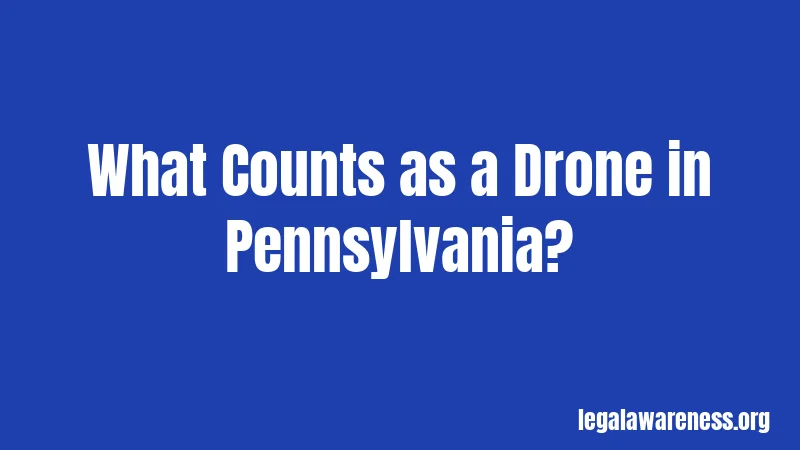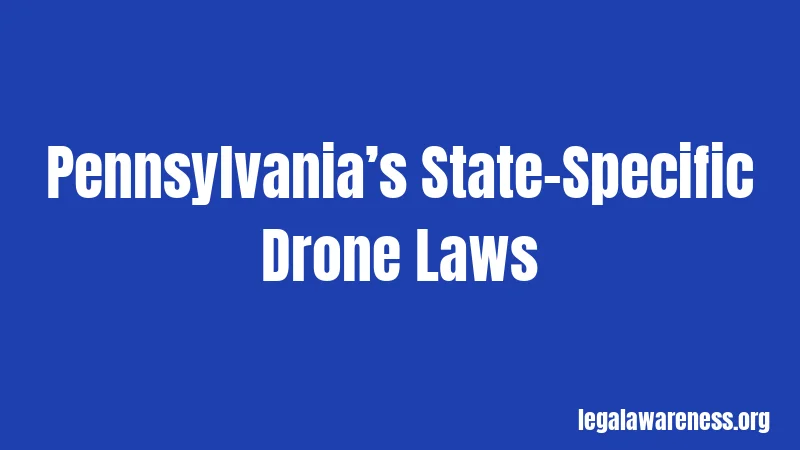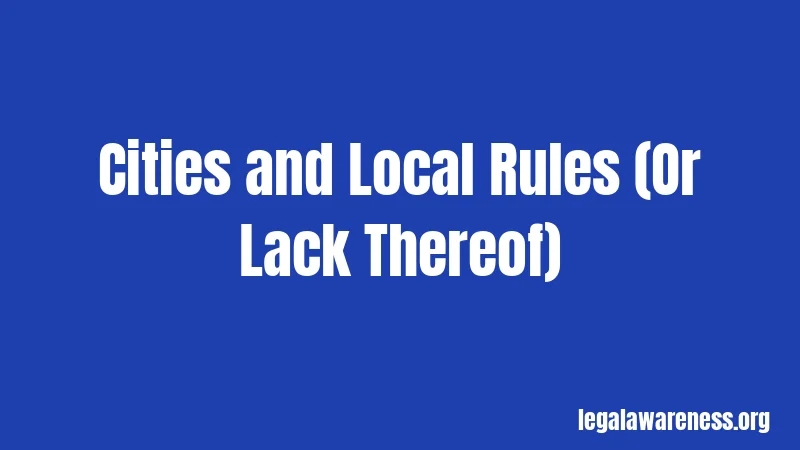Drone Laws in Pennsylvania (2026): Flying Smart and Legal
Most people think flying a drone is totally simple. You just buy one and fly it, right? Wrong. Pennsylvania has some pretty strict rules about when, where, and how you can use your drone. Break these laws and you could face fines or even jail time. Let’s break down everything you need to know.
Here’s the deal. Pennsylvania follows federal FAA regulations, but the state also added its own rules in 2018. These laws cover privacy, safety, and where you can actually fly. Some violations are just fines. Others? Felonies. Yeah, it gets serious fast.
What Counts as a Drone in Pennsylvania?

Pennsylvania law defines a drone as any aircraft operated without direct human control from inside it. That includes everything from tiny toy drones to bigger professional models. If it flies and doesn’t have a pilot sitting in it, it’s a drone.
The state calls them “unmanned aircraft.” The FAA uses the term UAS (Unmanned Aircraft System). Same thing, different names. Don’t let the terminology confuse you.
Most drones people use weigh between 0.55 pounds and 55 pounds. Those are the ones Pennsylvania’s laws focus on. Anything heavier requires special certification from the FAA.
Basic Federal Rules That Apply in Pennsylvania
Okay, let’s start with the federal baseline. The FAA controls all US airspace. That means their rules apply everywhere in Pennsylvania, whether you’re in Philadelphia, Pittsburgh, or the middle of nowhere.
You must register your drone if it weighs more than 0.55 pounds (250 grams). Registration costs $5 and lasts three years. You do this online through the FAA’s DroneZone portal. Takes about five minutes.
Your drone needs to stay below 400 feet above ground level. That’s roughly the height of a 40-story building. Flying higher puts you in the path of actual aircraft. Not good.
Keep your drone in sight at all times. You can’t fly it behind buildings or let it disappear over a hill. If you can’t see it, you’re breaking the rules. This is called visual line of sight, or VLOS.
Don’t fly near airports without permission. Most airports have restricted zones extending several miles out. You need authorization through the FAA’s LAANC system to fly in these areas.
Never fly over people or moving vehicles. The only exception is if you have special FAA waivers. Even then, your drone needs extra safety features like parachutes.
Flying drunk or high is illegal. Seriously. The FAA treats this like drunk driving. Don’t do it.
You need to pass the TRUST test for recreational flying. It’s free and takes about 30 minutes online. For commercial flying, you need a Part 107 certificate, which requires studying and passing a real test.
Pennsylvania’s State-Specific Drone Laws

Hold on, this part is important. Pennsylvania passed Act 78 in 2018. This law created three specific crimes related to drone use.
First up: using a drone to spy on someone in a private place. If you fly your drone to peek into someone’s home, backyard, or anywhere they expect privacy, you’re committing a crime. The fine is up to $300.
Second: flying in a way that scares people. If you buzz your drone near someone so they fear getting hurt, that’s illegal too. Another $300 fine.
Third: using drones to deliver contraband. This is the big one. If you use a drone to smuggle drugs, weapons, or anything illegal into prisons or across property lines, you’re facing a second-degree felony. That means years in prison and massive fines.
Wondering if this applies to you? If you’re flying responsibly and not trying to invade anyone’s privacy or scare them, you’re probably fine. But these laws exist because people were doing exactly those things.
State Parks and Where You Can Fly
Pennsylvania has a weird policy about state parks. Most people assume you can fly anywhere outdoors. Nope. The Department of Conservation and Natural Resources (DCNR) restricts drone use in almost all state parks.
There are only six state parks with designated drone flying areas. That’s it. Six out of 121 state parks.
Here they are:
- Beltzville State Park
- Benjamin Rush State Park
- Hillman State Park
- Lackawanna State Park
- Prompton State Park
- Tuscarora State Park
You must call the park office before flying. Each park has specific zones where drones are allowed. The entire park isn’t open for flying. Just certain spots.
Flying in any other Pennsylvania state park is prohibited. You can face fines and get kicked out.
Why so strict? Privacy concerns, noise complaints, and protecting wildlife. The state wants to balance outdoor recreation with keeping parks peaceful.
Cities and Local Rules (Or Lack Thereof)

Here’s where it gets interesting. Pennsylvania created a preemption law in 2018. This law says cities and counties cannot create their own drone regulations.
What does that mean? Philadelphia can’t ban drones. Pittsburgh can’t make special rules. Small towns can’t create local restrictions. The state took control of all drone regulations.
This is actually good news for drone pilots. You don’t need to research every tiny town’s rules. State and federal laws are all you need to know.
That said, some cities still have restrictions on city-owned property. Philadelphia requires permits to take off or land on city property. Pittsburgh has similar rules for city parks. But these are property rules, not drone-specific laws.
Hunting with Drones Is Illegal
Listen closely. Using a drone to hunt or scout wildlife is completely illegal in Pennsylvania. The Game Commission is very clear about this.
You cannot use a drone to locate deer. You cannot use it to track wounded animals. You cannot use it to scout hunting spots. Period.
Hunters caught using drones face fines up to $2,500 and up to three months in jail. The Game Commission can also confiscate your drone and suspend your hunting license.
However, this might change soon. State Senator Jarrett Coleman introduced a bill in 2025 to allow drones for recovering wounded deer and bears. If it passes, hunters could legally use thermal drones to find animals they’ve already shot. But as of 2026, it’s still illegal.
Why the restriction? Fair chase principles. The Game Commission believes using technology to track animals gives hunters an unfair advantage. They want hunting to remain a traditional skill-based activity.
Can You Shoot Down a Drone Over Your Property?
No. Absolutely not. This is probably the most important thing to understand.
Shooting down a drone is a federal crime. The FAA classifies drones as aircraft. Destroying an aircraft is a felony under 18 U.S.C. § 32(a). Penalties include fines and up to 20 years in prison.
It doesn’t matter if the drone is over your property. You don’t own the airspace above your house. The federal government does.
Plus, you could hurt someone. Drones fall when shot. They can weigh several pounds and crash at high speeds. You might hit a person, damage property, or miss and shoot someone else.
What should you do instead? Document it. Take photos and videos. Note the time and date. Then call local police. They can track down the owner and handle it legally.
If the drone is hovering right outside your window repeatedly, that might violate Pennsylvania’s surveillance law. Law enforcement can investigate and potentially charge the operator.
Penalties for Breaking Drone Laws
Let’s talk consequences. Pennsylvania doesn’t mess around with drone violations.
For surveillance or scaring someone: Up to $300 fine per offense. These are summary offenses, similar to traffic tickets.
For delivering contraband: Second-degree felony. This means 5 to 10 years in prison and fines up to $25,000. It’s a serious crime.
For federal violations: The FAA can fine you up to $27,500 for recreational violations and up to $250,000 for commercial violations. They rarely impose maximum fines, but they can.
For flying without registration: Civil penalties starting at $182 per violation.
For flying near airports without authorization: FAA fines and possible criminal charges, especially if you interfere with aircraft.
For shooting down someone else’s drone: State criminal mischief charges (based on the drone’s value) and federal charges for destroying aircraft.
Honestly, the penalties can add up fast. One stupid decision can cost you thousands of dollars and create a criminal record.
Commercial vs. Recreational Flying
There’s a big difference between flying for fun and flying for business.
Recreational pilots need the TRUST certificate. It’s free and takes 30 minutes online. You just watch some videos and pass a simple test. You’re limited to flying for fun only.
Commercial pilots need a Part 107 certificate. This requires studying aeronautical knowledge and passing an FAA test. It costs around $175 to take the test. You must be at least 16 years old.
What counts as commercial? Anything where you’re paid or the footage benefits a business. Real estate photography? Commercial. Wedding videos? Commercial. Posting drone videos on YouTube with ads? That’s commercial too.
You can’t do side jobs on a recreational certificate. Even if you’re not paid, if it’s for someone’s business, you need Part 107.
Commercial pilots have slightly different rules. You can fly at night with proper training and anti-collision lighting. You can fly over people in certain situations. You have more flexibility, but also more responsibility.
Night Flying and Special Situations
Flying at night is legal, but there are rules. Your drone needs anti-collision lighting visible for three miles. You also need to complete night flying training if you’re flying commercially.
Remote ID is now required for most drones. Starting in 2023, drones over 0.55 pounds must broadcast their location and operator information. It’s like a digital license plate. Some drones have this built-in. Others need an external Remote ID module.
Flying in controlled airspace requires LAANC authorization. This is an automated system that gives you permission to fly near airports. You submit a request through an app like Aloft or AirMap. Approval usually takes seconds if you’re requesting reasonable altitudes and times.
Special events can create temporary flight restrictions. Sporting events, presidential visits, and emergencies can shut down airspace. Check the FAA website or B4UFLY app before flying anywhere crowded.
Where You Should Actually Fly
So where can you legally fly without hassle? Here are some good spots:
Private property (with owner permission): Your backyard is fine. A friend’s farm is fine. Always get permission if it’s not your land.
Rural areas: Pennsylvania has plenty of open farmland and countryside. As long as you’re not bothering people or flying in restricted airspace, these areas work great.
Designated state park zones: Those six state parks we mentioned earlier. Call ahead and confirm the exact flying areas.
RC flying fields: Many hobby clubs have dedicated fields for flying. These are perfect for practicing and meeting other pilots.
Benjamin Rush State Park in Philadelphia is one of the most accessible designated flying areas. It’s popular with the local drone community.
Pretty straightforward, right? Stick to open areas, respect people’s privacy, and check for airspace restrictions.
How to Stay Legal and Avoid Problems
Here’s what you need to do step by step:
Register your drone through the FAA DroneZone website. It costs $5 and takes five minutes. Put your registration number on your drone.
Pass the TRUST test if you’re flying recreationally. It’s free at several websites approved by the FAA.
Get your Part 107 certificate if you’re flying commercially. Study guides and practice tests are available online.
Download the B4UFLY app before every flight. It shows you restricted airspace and current flight restrictions.
Follow the rules. Keep your drone below 400 feet, in sight, away from airports, and away from people. Don’t fly over crowds or moving cars.
Respect privacy. Don’t fly over private property at low altitudes. Don’t point your camera into windows or backyards. Be a good neighbor.
Carry proof of registration and your test completion certificate. Some people, especially law enforcement, might ask to see it.
Check weather conditions. Don’t fly in high winds, rain, or fog. It’s dangerous and you could lose your drone.
Stay sober. Never fly under the influence of alcohol or drugs.
What to Do If Police Stop You
Sometimes police might approach you while flying. Stay calm. Here’s how to handle it:
Be polite and cooperative. Show them your registration and certificate. Explain what you’re doing.
Know your rights. You can legally fly in most public areas as long as you’re following FAA rules and state laws.
Don’t resist or argue if they ask you to stop. It’s not worth it. You can fight tickets later if needed.
If you’re accused of violating state laws (surveillance, scaring people), don’t admit anything. Politely decline to answer questions and contact a lawyer.
If you were flying legally and following all rules, document everything. Get names and badge numbers. Take photos of your location. This helps if you need to dispute charges later.
Most police interactions are fine. They’re just checking that you’re following the rules. Be respectful and show you know what you’re doing.
Future Changes to Watch
Pennsylvania’s drone laws are evolving. Here’s what might change soon:
The drone deer recovery bill could pass in 2026. This would allow hunters to use drones to find wounded animals. It’s still being debated, but support is growing.
There’s proposed legislation about drone trespassing. Currently, flying over private property isn’t specifically illegal. But some lawmakers want to change that. Virginia and Utah already have drone trespassing laws.
Commercial drone delivery might expand. Amazon and other companies are testing delivery drones. Pennsylvania would need to update regulations to accommodate this.
The FAA continues updating its rules. Remote ID requirements are relatively new. More changes are coming as drone technology advances.
Frequently Asked Questions
Do I need a license to fly a drone in Pennsylvania? You need the TRUST certificate for recreational flying and a Part 107 certificate for commercial flying. Both are federal requirements that apply in Pennsylvania.
Can I fly my drone in Philadelphia or Pittsburgh? Yes, but check for restricted airspace first. Both cities have major airports with controlled airspace extending for miles. You may need LAANC authorization.
What if my drone weighs less than 250 grams? You don’t need to register it, but you still must follow all other FAA and state rules. Small drones aren’t exempt from privacy and safety laws.
Can I fly over my neighbor’s property? Technically yes, but don’t fly low or point cameras at their house. Respect their privacy or you could face harassment or surveillance charges.
What happens if I crash my drone and it damages property? You’re liable for the damage. This is why many pilots get liability insurance. It’s not required but highly recommended.
Final Thoughts
Pennsylvania drone laws aren’t that complicated once you understand them. Register your drone, pass the TRUST test, respect privacy, and stay away from airports. That covers 90% of situations.
The state keeps it simple by preventing cities from making their own rules. You don’t need to memorize 50 different local ordinances. Just follow federal and state laws.
Most violations happen because people don’t realize certain things are illegal. Now you know. Flying drones is fun and legal when done right. Stay informed, fly responsibly, and you’ll never have problems.
When in doubt, don’t fly. Research first. Check the B4UFLY app. Ask in local drone groups on social media. Better safe than sorry.
References
- Pennsylvania Act 78 of 2018 – Title 18 Section 3505 (Unlawful Use of Unmanned Aircraft) – https://www.legis.state.pa.us/cfdocs/legis/li/uconsCheck.cfm?yr=2018&sessInd=0&act=78
- Federal Aviation Administration – Recreational Flyers & Modeler Community-Based Organizations – https://www.faa.gov/uas/recreational_fliers
- Pennsylvania Department of Conservation and Natural Resources – Unmanned Aerial Systems and Drones – https://www.dcnr.pa.gov/StateParks/RulesAndRegulations/UnmannedAerialSystemsandDrones/Pages/default.aspx
- Federal Aviation Administration – FAA DroneZone – https://faadronezone.faa.gov/
- Pennsylvania Ready – Drones Information – https://www.pa.gov/agencies/ready/drones
- Federal Aviation Administration – Part 107 Rules – https://www.faa.gov/uas/commercial_operators
